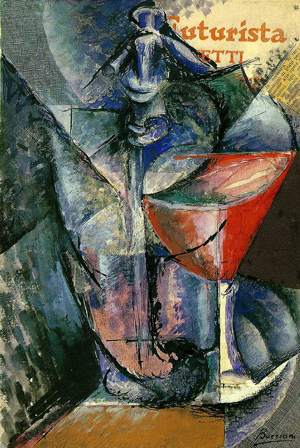Я сра´зу сма´зал ка´рту бу´дня,
плесну´вши кра´ску из стака´на;
я показа´л на блю´де сту´дня
косы´е ску´лы океа´на.
На чешуе´ жестя´ной ры´бы
прочёл я зо´вы но´вых губ.
А вы
ноктю´рн сыгра´ть
могли´ бы
на фле´йте водосто´чных труб?

Я сра´зу сма´зал ка´рту бу´дня,
плесну´вши кра´ску из стака´на;
я показа´л на блю´де сту´дня
косы´е ску´лы океа´на.
На чешуе´ жестя´ной ры´бы
прочёл я зо´вы но´вых губ.
А вы
ноктю´рн сыгра´ть
могли´ бы
на фле´йте водосто´чных труб?
Эти, казалось бы, загадочные футуристические стихи написаны после обеда в ресторане, где накануне Маяковский внимательно изучал меню дня. Стихотворение очень богато образами, вырастающими из повседневных предметов, какими их видит в своем воображении поэт – футурист: красное вино становится краской в стакане, форма для заливного из рыбы превращается в жестяную рыбу, отпечатки рыбных чешуек на холодце в наклонные скулы океана, и т.д.
This seeminly obscure futuristic poem was written after a meal at the restaurant where Mayakovsky studied the menu the day before. This poem is very rich in imagery that grew out of everyday items as seen by a Futurist (i.e. red wine becomes the paint in a glass, the tin mold for fish aspic turns into a fish, the imprints of the fish scales on aspic become the slanted cheekbones of the ocean, etc)
Identify all Perfective verbs in the poem (4) and list them here providing their Imperfective counterparts and their meaning in English:
Create your own examples with сыгра´ть and показа´ть (кому)
«Звать - зов - называ´ть - назва´ние» share the common root. Find the root and write its meaning in English.
Create two examples with any of these words.
Find the two roots in «водосто´чный» and identify their meaning in English:
Create your own sentence with the verb течь (Impf.) – to flow. Течь conjugates exactly like the verb печь – to bake. (я теку´, ты течёшь, он/а течёт, мы течём, вы течёте, они теку´т)
Be a poet and finish the conditional sentence «А вы могли бы